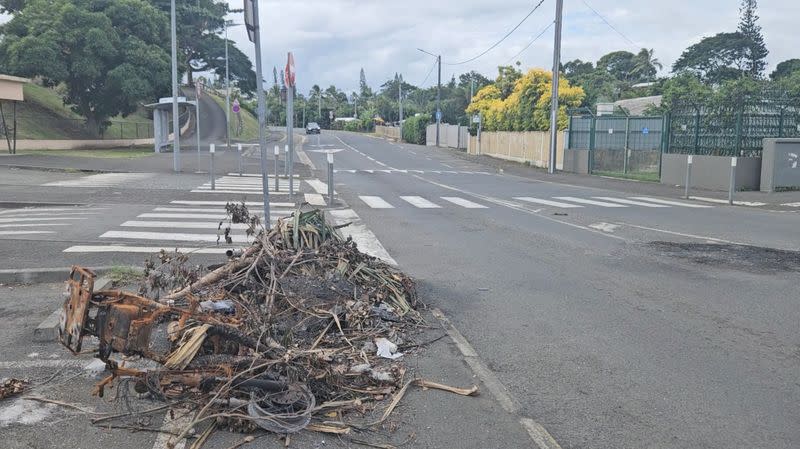Explainer-What New Caledonia riots mean for the nickel industry

By Gus Trompiz
PARIS (Reuters) - A wave of civil unrest in New Caledonia, a French overseas territory in the southern Pacific that is a leading nickel producer, has halted mining operations and supported a rally in prices for the metal.
Here's why New Caledonia's nickel industry matters politically and on global markets.
HOW BIG IS NEW CALEDONIA'S NICKEL SECTOR AND WHO RUNS IT?
New Caledonia holds the world's fifth largest reserves of nickel, a metal mainly used in stainless steel and increasingly for electric vehicle batteries, and in 2023 ranked No. 3 globally in terms of mined nickel.
The archipelago's nickel mining industry dates back to the 19th century when the territory and its indigenous Kanak population were colonised by France.
New Caledonia's three main nickel companies are Koniambo Nickel SAS (KNS), Prony Resources New Caledonia (PRNC) and Societe Le Nickel (SLN). Each supplies its own processing plant. Together they generate around 13,000 direct and indirect jobs, according to the authorities.
KNS is owned by New Caledonia's northern province and global miner and trader Glencore, PRNC has several shareholders including commodity merchant Trafigura, while SLN - New Caledonia's historic nickel producer - is majority owned by French mining group Eramet.
WHAT IMPACT HAS THE UNREST HAD ON THE NICKEL INDUSTRY?
Most mines have stopped operating, while SLN has reported fire damage to a conveyor at one mine. SLN has also reduced output to minimum capacity at its processing plant.
The unrest supported a rally in benchmark nickel prices on the London Metal Exchange to nine-month highs, before prices fell back. Reduced New Caledonian output could erode a global surplus. [MET/L]
New Caledonian output was below full capacity before the riots and analysts expect prices to be capped longer term by continuing growth in Indonesian supply.
KNS' mine and processing plant have been idled since February and persistent disruption to SLN's mines has curbed its capacity.
WHY IS NEW CALEDONIA'S NICKEL SECTOR STRUGGLING?
The three miners lost money almost continuously over the past decade. They have relied on financial support from private shareholders and the French state, with the latter providing 700 million euros ($759 million) over 2016-2023.
High energy and labour costs in the remote territory have dogged the miners, while technical setbacks have also hurt output.
New Caledonia faces tough competition from cheaper suppliers. Indonesia has rapidly emerged as a nickel powerhouse, accounting for over half of nickel mined worldwide in 2023.
New Caledonia's political tensions have shaped the industry. The pro-independence northern province opposes exports of unrefined nickel ore and has had long-running permit disputes with SLN, which wants to expand ore shipments.
The industry teetered on the verge of collapse last year when global prices plunged and after both Eramet and Glencore said they would no longer inject funds.
The French government has been negotiating a rescue package, including a commitment to provide metal to Europe's battery supply chain. But talks have stalled amid the souring relations between pro-independence and loyalist parties.
The proposals include hundreds of millions of euros of public loans and energy subsidies along with a revamp of mining permits, exports and energy infrastructure.
WILL THE SECTOR FIND NEW INVESTORS?
Glencore and Prony are both trying to sell stakes in their respective companies.
Even before the unrest, analysts saw headwinds.
"It's difficult to put any names on potential investors," said Nikhil Shah at consultancy CRU. Concerns over supply-chain reliance on Indonesia might help maintain interest in New Caledonian nickel, he added.
KNS' plant has been plagued by engineering issues but if resolved it could leverage an efficient mine and port, mining consultant Didier Julienne said.
Glencore has idled its KNS plant for six months while it seeks a buyer for its 49% stake.
KNS told Reuters by email that a possible extension of the period was being studied but that this was unrelated to the unrest. Glencore said in an emailed statement: "The sale process remains ongoing. We have no plans to extend it."
PRNC told Reuters in April that it sought a core investor to acquire a 74% interest by buying out shareholders including Trafigura. The group was relaunched in 2021 when Brazil's Vale sold the business. A contract with Tesla heralded a focus on EV batteries.
Eramet has said it will provide ongoing operational support for SLN after a deal with Paris to convert debt. A spokesperson said there were no discussions to sell SLN.
($1 = 0.9223 euros)
(Reporting by Gus Trompiz, additional reporting by Pratima Desai; Editing by Richard Lough and Emelia Sithole-Matarise)

 Yahoo Finance
Yahoo Finance 